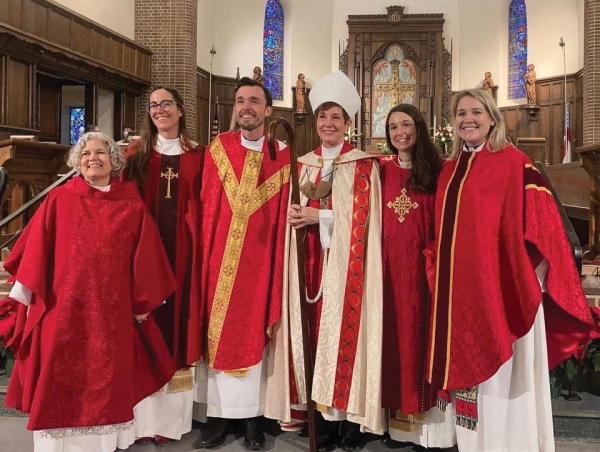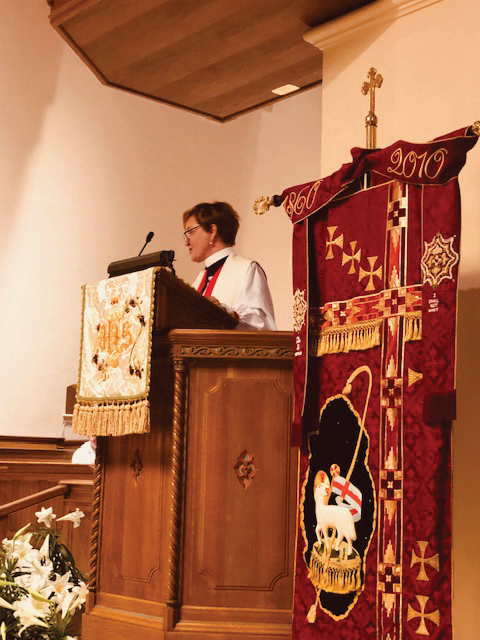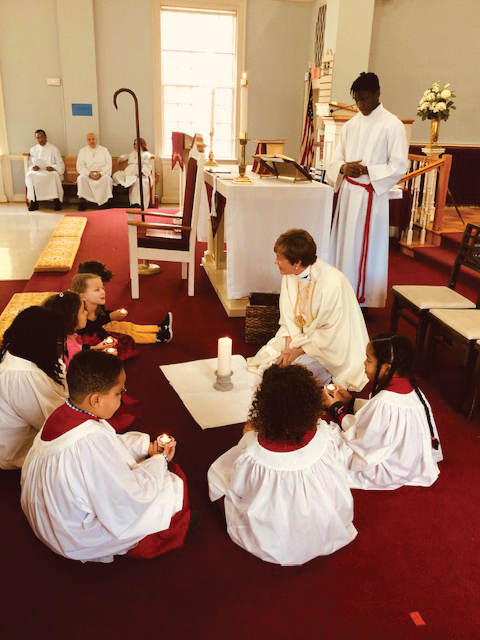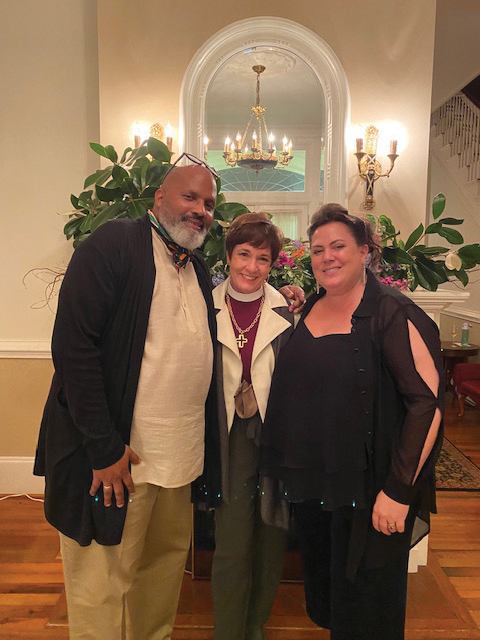Disciple: An Interview with Bishop Jennifer Brooke-Davidson

The Rt. Rev. Jennifer Brooke-Davidson was announced as the assistant bishop of the Diocese of North Carolina on August 16. She spoke with the Disciple about her calling, ministry experiences and passions. The following interview has been edited for length and clarity.
[Image: The Rt. Rev. Jennifer Brooke-Davidson, new assistant bishop of North Carolina, ordains priests in the Diocese of Virginia. Photos throughout courtesy of Brooke-Davidson]
An assistant bishop does exactly what a bishop suffragan does, which is to share with the bishop diocesan in the leadership of the Church. That includes the Diocese, The Episcopal Church and the Anglican Communion. As an assistant bishop, I have canonical status with voice and vote in the House of Bishops. The difference between a bishop suffragan and an assistant bishop is that a suffragan is elected under the canons of the diocese, and an assistant is called by the bishop diocesan and voted on by Convention. It’s actually different from diocese to diocese, but, in this diocese, that’s how it works.
Often, the bishop diocesan will delegate oversight of certain areas of ministry to the assistant bishop. For Bishop Sam and me in North Carolina, that will include, among other things, Christian formation, mission strategy implementation and diaconal formation. I’m very excited about all of them. I have spent a lot of my ministry life in Christian formation at all levels, but I haven’t been as involved in that work as a bishop, so I’m really looking forward to supporting those ministries more directly again. And implementation of the North Carolina mission strategy just makes my heart sing.
That goes back a long way! I was born and raised in Corpus Christi, which is on the coast, kind of where the ranch land of South Texas meets the Gulf of Mexico. There are fabulous beaches, horses and cows, all the things people think about when they think about Texas, but also a rich multicultural environment with a deep and complex history.
 I grew up in the Church of the Good Shepherd in Corpus Christi, a big, old Episcopal church that my grandparents were very involved in building, so that is very much a part of my background. I was in the Junior Daughters of the King, and I was in the choir, but women and girls did not serve otherwise, except behind the scenes, in the worship space. Women were not ushers. Women couldn’t serve on vestries. There were no girl acolytes.
I grew up in the Church of the Good Shepherd in Corpus Christi, a big, old Episcopal church that my grandparents were very involved in building, so that is very much a part of my background. I was in the Junior Daughters of the King, and I was in the choir, but women and girls did not serve otherwise, except behind the scenes, in the worship space. Women were not ushers. Women couldn’t serve on vestries. There were no girl acolytes.
[Image: Brooke-Davidson preaches for the first time as a bishop from the pulpit of the church where she grew up, and where she once served as a lay reader with her grandfather.]
I graduated from high school in Corpus Christi, and then I went to Yale. After college, I went back to Austin for law school, which is where I met my husband, Carrick. He got a job in the honors program for the Justice Department, so that’s how we got to Washington, D.C.
Mainly contracts, lending, corporate and real estate. I had a subspecialty of lending for radio station acquisitions, which is a weird subspecialty for technical reasons.
When did you first start to hear a call to ordained ministry? It must have been a really big transition.
Initially I couldn’t identify it as a call to ordained ministry because that really wasn’t part of my universe. There were women priests by the time I was practicing law, but they were pretty rare, and they hadn’t been part of my personal experience. I started hearing a call toward some kind of spiritual leadership or role in the Church, but I didn’t have any place to park it. It was just kind of there, sometimes literally in dreams.
So that’s how my call happened: a little bit at a time, and then, one day, it’s just all in.
I served in two. The first was St. Stephen’s in Wimberley, where I had been for a number of years, and stayed on as the assistant rector for a couple of years.
 That changed when three of us, all young mothers, connected with one another and started developing a family ministry. We worked really hard on it, and the church, for that and other reasons, grew tremendously. Over the 12 years I was there, it went from 120 on Sunday morning to almost 300. To be with the church through that kind of transformation was amazing.
That changed when three of us, all young mothers, connected with one another and started developing a family ministry. We worked really hard on it, and the church, for that and other reasons, grew tremendously. Over the 12 years I was there, it went from 120 on Sunday morning to almost 300. To be with the church through that kind of transformation was amazing.
[Image: Throughout her ministry, Brooke-Davidson has focused on formation and family ministry.]
I think that had to do with the leadership being very, very focused on listening to God in Scripture and in the world around them. The real turning point came with a strong prayer team focused significantly and powerfully on the health of that church. When that happened, things just started taking off. It became a really outwardly focused, healthy place.
I went home, and my phone rang. And I thought: This is trouble. And it was. It was a good, trusted friend of mine who said, I really want you to reconsider and allow us to nominate you. I prayed about it, and I finally said, if that’s what you all are calling me to do, I’m willing to participate. And so I did. And what happened is what sometimes happens, which is God said, “Here we go,” and I was elected, which filled me with surprise and joy. I was called as bishop suffragan to serve with bishop diocesan David Reed. West Texas is a great diocese, a great place, 87 churches across 66,000 square miles. One of the former bishops used to say that’s bigger than any state east of the Mississippi. So it’s a very large diocese, geographically, and very diverse.
I oversaw all the mission congregations, and I oversaw congregational development. All of that dovetailed with formation for clergy in those congregations.
Former Archbishop of Canterbury Rowan Williams used to talk about having a mixed economy in the church. It’s a helpful metaphor. We can also think about it as an ecosystem, where you have some things that are very familiar to us, and some things resonate more with others. And it doesn’t mean that you’re replacing one or the other; they all kind of coexist in the glorious ecosystem of the Beloved Community.
 That was an undeniable God thing. That call really came out of the wild blue. I knew Bishop Goff and was in a conversation with her about something else during a retreat up at Roslyn Retreat Center in Richmond, Virginia. We were standing in the dining hall talking about something, and all of a sudden she stopped and looked at me, and there was a silence, and she said, “Would you consider coming to serve as the assistant bishop in the Diocese of Virginia?” The whole world came to a standstill, and we stood there and looked at each other for a long time. She says she had no intention or idea of doing that, that she was surprised to hear these works come out of her mouth, and I felt stunned—a the-walls-were-spinning kind of stunned. We both felt a clear call that neither of us had expected or planned.
That was an undeniable God thing. That call really came out of the wild blue. I knew Bishop Goff and was in a conversation with her about something else during a retreat up at Roslyn Retreat Center in Richmond, Virginia. We were standing in the dining hall talking about something, and all of a sudden she stopped and looked at me, and there was a silence, and she said, “Would you consider coming to serve as the assistant bishop in the Diocese of Virginia?” The whole world came to a standstill, and we stood there and looked at each other for a long time. She says she had no intention or idea of doing that, that she was surprised to hear these works come out of her mouth, and I felt stunned—a the-walls-were-spinning kind of stunned. We both felt a clear call that neither of us had expected or planned.
[Image: While serving as assistant bishop in the Diocese of Virginia, Brooke-Davidson worked with The Underground Kitchen on an enormous COVID-19 feeding program that later moved into food justice work. She is pictured with entrepreneurs Michael Sparks and Kate Hauck at a dinner commemorating enslaved Black artisans and engineers.]
It excites me to be in a place that’s so clearly Gospel-centered and so willing to roll up its sleeves to share the Good News that God loves us and wants us to have abundant life. It’s a place that is bringing the Gospel alive. To be in a place where people can see and say and do that is very exciting.
I’m impressed with how genuinely gracious the people are. I am amazed at the depth and breadth of the stewardship of creation that is happening. It’s really heartwarming to see that work and to see all the places creation care intersects with our other concerns, like racial justice and healing and Christian formation. They’re all tied together, and to see them actually expressed in that way is wonderful.
Carrick and I met in law school. We’ve been married for 37 years. He’s an environmental attorney working here in Raleigh at Williams Mullen. We have two grown daughters, Emma and Kate. Emma is moving soon from Chicago to Colorado to take a job in computer coding. Kate is living in Washington, D.C., and working for the Central American Resource Center, supporting Central American immigrants and doing significant work with the newcomers who are being bussed from Texas and Arizona to D.C.
Do you have any pets?
We have two cats, Sid Vicious and Skye. We inherited Sid from our daughter and Skye from my mother. One day we’ll get our own cat.
I am eagerly awaiting Louise Penny’s new novel in the Inspector Gamache series, which comes out tomorrow. I’m working on finishing Caste by Isabel Wilkerson, which is about the roots of racism and class. I’m also reading a stack of books about North Carolina!
And are you a TV person?
Not particularly, but I will binge watch things occasionally. I am enjoying Blue Bloods because I served as police chaplain when I was in Buda, Texas, and Blue Bloods has an incredibly interesting take on what it’s like to be in law enforcement and be a deeply religious Roman Catholic.
I love gardening—another reason I love North Carolina. I have planted probably a hundred pansies in pots since I got here. I used to do a lot of cooking and still like it, but a bishop’s schedule makes it a little challenging.
So happy to be in a basketball state with such good teams! Personally, I’m a solo sports person. I love sailing. I’m just kind of like, find me a force of nature that I can harness myself to, and I’m happy. I also enjoy watching my husband play ice hockey.
Tags: North Carolina Disciple
